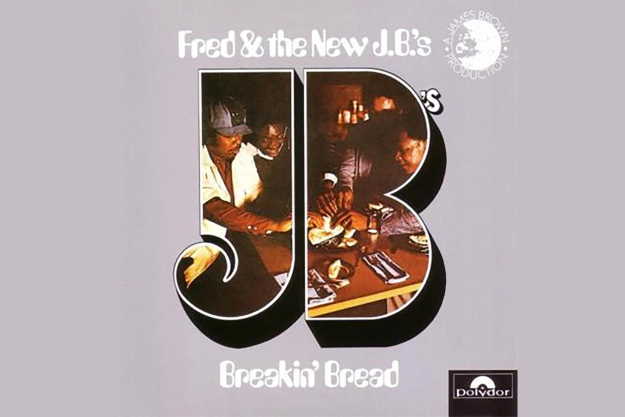| |
Taken from Bangkok Post (Mar 13, 2020)
Trombone's place in modern music
Centuries-old instrument fell out of favour as 1940s bebop era began, but musicians are still keeping its sound and spirit alive
by John Clewley

Breakin' Bread Cover |
The funky sound of Fred Wesley's trombone landed on the World Beat desk this week courtesy of an album he released in 1974, with his band, Fred Wesley & the New JB's, called Breakin' Bread (originally released on Polydor, re-released 2015). Wesley was James Brown's musical director at the time, and Brown produced the album and co-wrote most of the songs with Wesley.
Wesley, along with saxophonist Maceo Parker, bass player Bootsy Collins, drummers like Clyde Stubblefield, helped Brown define his funk sound in the 1960s and 70s. The band was called The JBs and a year earlier, in April 1973, Fred Wesley & The JB's released a single, Doin' It To Death (also known as Gonna Have A Funky Good Time). On this record, Wesley, after Brown's dramatically sung exhortation, launches into a trombone solo that just raises the roof; it's my favourite trombone solo.
Ever since I heard that track, I've been a Wesley fan, following his solo career, as well as his seminal work with Parliament/Funkadelic. He has the jazz chops, too, having worked with Count Basie's Orchestra.
Breakin' Bread kicks off with the title track, a straight-ahead funk, what he describes as "super heavy and funky" in a song that pays homage to the solidarity and fun of home life -- something Wesley talks about in a short intro before the track begins. I Wanna Get Down is next up with a track that is reminiscent of New Orleans funk outfit The Meters, especially with its shouted chorus. But my favourites are Little Boy Black, with its rap-like vocal intro and Wesley's trombone solo, Rice 'N' Ribs, which cooks with Hearlon "Cheese" Martin on guitar and Wesley's trombone duelling with the horn section, and Funky Music Is My Style, which features wah-wah guitar, Latin percussion and horn riffs in a song that sounds a lot like P-Funk.
Wesley also has recorded as the Horny Horns, which was the horn section associated with Parliament-Funkadelic and Bootsy's Rubber Band (and featured Maceo Parker, Rick Gardner and Richard "Kush" Griffith on trumpets). To get an idea of just how good this horn section was, have a look on YouTube for their track Four Play.
Wesley's chosen instrument, the trombone, has a history that stretches back five hundred years. The name comes from the Italian for "large trumpet" and until the 18th century it was called a "sackbut" in English; trombones with valves (to lower the pitch) came in during the middle of the 19th century. And despite its widespread use in orchestras and ensembles in Western classical music, brass band and marching music, and, of course, jazz, it is not as well known as the saxophone or trumpet.
When I was a kid, I heard the trombone of Jack Teagarden at home, and later I discovered that this Texas-born, self-taught jazz genius was one of the most innovative trombonists in the early development of jazz, often credited with liberating his instrument in the way his lifelong friend Louis Armstrong had done in the 1920s, to create space for solos in a jazz ensemble or orchestra.
Teagarden was sometimes called "the best trombone player in the world", but during the bebop era his status was challenged by someone who would redefine the jazz trombone's sound: JJ Johnson.
As the bebop era began in the 1940s, the trombone fell out of favour; the saxophone and trumpet were considered better-suited to bebop's technical demands. Having played with the Count Basie Orchestra and trumpeter Fats Navarro, Johnson was already a good player and he caught the eye of bebop legend Dizzie Gillespie who encouraged him to play bebop on his horn. Listen to his version of Gillespie's bebop classic, A Night in Tunisia, on YouTube and you can hear the trombone breezing though the fast tempo of bebop with aplomb; interestingly, the sound you hear is from two trombones. On the track, Johnson performs with Kai Winding, with whom he had a combo called the Jay and Kai Quintet.
Johnson went on to a stellar career as a solo session musician and a composer of classical-jazz collaborations; and he also wrote Hollywood soundtracks -- a real renaissance man.
Trombone players who have appeared in this column over the years include Latin Jazz bandleaders like Jimmy Bosch; Willie Colon of Fania All Stars and producer at the Fania Records, began his career as a trombonist. Don Drummond, one of the original members of the hugely influential Jamaican ska band, the Skatalites, and a renowned jazz musician is another favourite. And it's good to see trombone players here in Bangkok in some of the local ska bands and salsa bands. All power to the trombone!
|
|